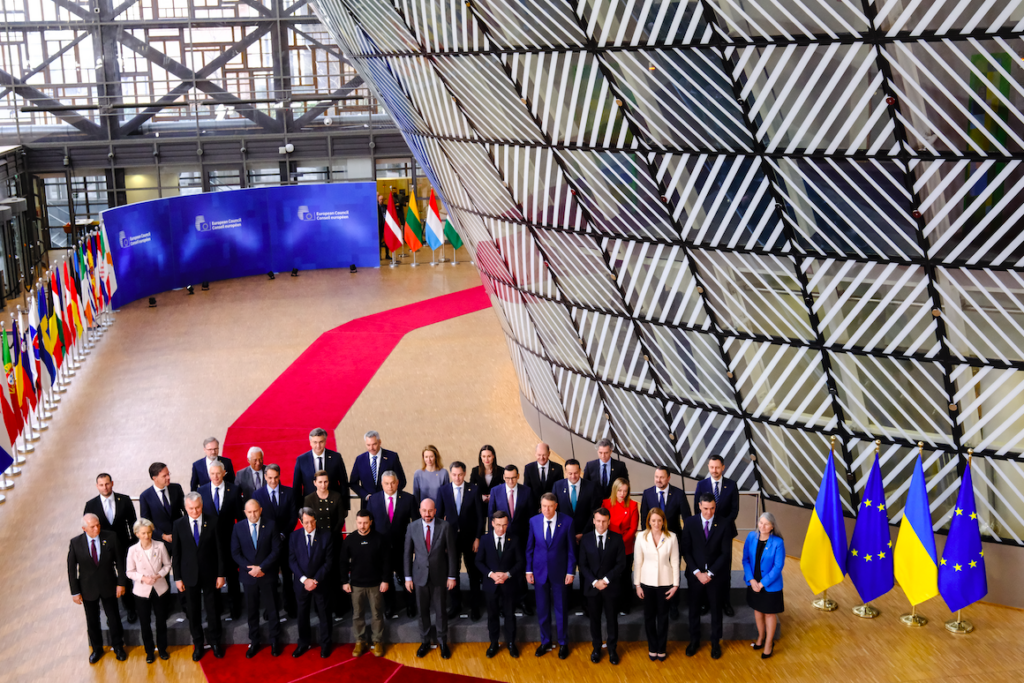BRUSSELS BEHIND THE SCENES
Weekly analysis with Sam Morgan
A European Council summit this week made it clear that the EU is not going to contemplate new members anytime soon and will be doing its best to make sure as few people as possible make a home for themselves here.
EU enlargement policy threatened a comeback late last year, when a flurry of new applications were lodged, existing candidates began membership talks and ongoing negotiations made progress.
But, as predicted by many, it is proving to be a false dawn and Brussels risks completely obliterating the ratcheting effect the prospect of membership can exert on candidate countries.
Couple that with the EU’s clear shift towards a hardened stance on migration and it is difficult to deny that ‘Fortress Europe’ is not just being built, but is standing tall and foreboding.
BRUSSELS BEHIND THE SCENES includes weekly analysis not found anywhere else, as Sam Morgan helps you make sense of what is happening in Brussels. If you want to receive Brussels Behind the Scenes straight to your inbox every week, subscribe to the newsletter here.
Ukrainian President Volodymyr Zelenskyy arrived in Brussels with two main asks of the gathered prime ministers and presidents: more military aid and EU membership talks by the end of the year.
His country, by all accounts, is only likely to get more tanks and maybe, eventually, warplanes. The prospect of enlargement negotiations getting a green light or even starting in 2023 is a distant one.
European Commission President Ursula von der Leyen followed up on what was said at last week’s Ukraine summit in Kyiv by reiterating that it is a merit-based process and that reforms will mean progress.
Council President Charles Michel nervously said he would feel a lot of pressure trying to broker unanimity among the 27 member states, when pressed by Zelenskyy to try and secure a negotiation green light by year’s end.
Ukraine will make reforms, of that there is no doubt, but governments will only agree to talks when the war is over. Putting a date on that is an impossible prediction to make.
Among the other candidates, there are major obstacles as well. Moldova’s EU-friendly prime minister resigned this week and although she is likely to be replaced by another West-leaning figurehead, it shows how volatile the Eastern European country is.
Serbia, once upon a time the likeliest candidate to become the next full member, continues to veer from the path, while political turbulence in Montenegro impedes progress. Bosnia is now a candidate but as unlikely as Ukraine – probably more unlikely – to start talks anytime soon.
The best hope for enlargement policy this year will be Albania and North Macedonia, although the latter continues to be frustrated by Bulgaria’s incessant demands. Talks could progress this year, especially for Albania.
Fortress Europe
It is not just new countries that the EU is going to give the cold shoulder. New people will also be turned away at the gate as governments aim to strike a harder-than-ever line on migration policies.
This week’s summit was called specifically to deal with the migration concerns of member states and when it was announced that Zelenskyy would be attending, diplomats feared that the big item on the agenda would be kicked down the road.
Those fears were not without grounds, given how problematic migration policies at EU-level have been in recent years. But, the summit did deliver in the end and it may have demonstrated the impact Italy’s hard-right government is starting to have.
European politics watchers have decried the waning influence exerted by Italian Prime Minister Georgia Meloni, who has had the unenviable task of filling the giant shoes of Mario Draghi.
They have not been too far off the mark, given that Zelenskyy did not visit Rome this week and Meloni was not invited to Paris for Emmanuel Macron’s pre-summit meet up with Ukraine’s president and German Chancellor Olaf Scholz.
Remember the photos of Macron, Scholz and Draghi on their train heading for Kyiv last year? Italy’s fortunes have, as predicted, fallen when it comes to the diplomatic pecking order.
But on migration, Meloni made progress at this summit. Leaders agreed to use tools like visa regimes, trade flows and even development aid to get non-EU countries to play ball and deal with illegal migrants.
It is a win for Italy, Greece and other countries that are migrants’ first ports of call when looking for a new life in Europe. For their inland neighbours, it also means avoiding the discussion about relocation quotas. For now at least.
More money is going to be funnelled towards border staff and surveillance technology, which of course will indirectly subsidise fences and walls — governments will not have to pay as much for security guards and drones, so will fund their fences instead.
It is a huge contrast to the debate that was triggered by an uptick of migrants in 2015 and 2016 as a result of the Syrian civil war. Brussels was accused of building ‘Fortress Europe’ then and eight years later, it is hard to argue against that label.
BRUSSELS BEHIND THE SCENES includes weekly analysis not found anywhere else, as Sam Morgan helps you make sense of what is happening in Brussels. If you want to receive Brussels Behind the Scenes straight to your inbox every week, subscribe to the newsletter here.

